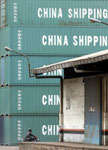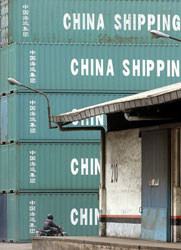 Reuters: Plans for fresh U.S. sanctions to isolate Tehran have sent shudders among Asian governments who fear they will have no way to pay for Iranian crude imports and face rising costs to fuel the region’s growing economies.
Reuters: Plans for fresh U.S. sanctions to isolate Tehran have sent shudders among Asian governments who fear they will have no way to pay for Iranian crude imports and face rising costs to fuel the region’s growing economies.
By Ju-min Park and Risa Maeda
 SEOUL/TOKYO (Reuters) – Plans for fresh U.S. sanctions to isolate Tehran have sent shudders among Asian governments who fear they will have no way to pay for Iranian crude imports and face rising costs to fuel the region’s growing economies.
SEOUL/TOKYO (Reuters) – Plans for fresh U.S. sanctions to isolate Tehran have sent shudders among Asian governments who fear they will have no way to pay for Iranian crude imports and face rising costs to fuel the region’s growing economies.
Top buyer China, meanwhile, is looking to cash in on the pressure Tehran faces to snap up discounted Iranian crude.
At stake is around 1.4 million barrels of oil Iran ships to Asia every day, meeting 10 percent of demand from top buyers China and India. South Korea, Japan and India are scrambling to find ways to keep the oil flowing.
Any restriction on oil supplies from Iran, the world’s fifth-largest crude exporter, could drive up already high oil prices and threaten economies already facing the impact of the euro zone debt crisis.
“This is an issue that could have a big impact on the global economy in terms of crude prices, so our nation will pay close attention to this with grave concern,” said Japanese Chief Cabinet Secretary Osamu Fujimura, adding his government was in “active negotiations” with Washington on the matter.
Japan is in talks with U.S. diplomats about a possible waiver to U.S. legislation that would make it more difficult to pay Iran. South Korea would also seek an exemption if the bill is signed into law, which U.S. Congress expects to send to President Barack Obama as early as this week.
Existing sanctions do not penalize non-U.S. refiners from buying Iranian crude, but they make it hard for foreign banks to pay Iran the hard currency that makes up around 50 percent of its government revenue. New U.S. measures would make paying harder still by blacklisting the OPEC member’s central bank.
EU leaders called on Friday for more sanctions against Iran by the end of January, in an effort to increase pressure on Tehran over its disputed nuclear program.
The United States has assured all Asian buyers, including China, that it would work with them to ensure the global oil market remained well supplied, as Washington seeks to derail Tehran’s nuclear program.
CHINA
It is unclear how the U.S. hopes China would cooperate if Washington imposes another round of unilateral sanctions. Beijing has previously criticized measures imposed outside United Nations’ sanctions.
China is Iran’s biggest oil buyer, taking over half a million barrels per day, and its top refiner, state-run Sinopec Corp., is trying to take advantage of Tehran’s growing isolation to obtain more attractive oil contract terms.
Beijing is Iran’s biggest trade partner but there is no sign Tehran is using oil to keep China sweet.
Tehran is not budging on terms and wants Sinopec and state oil trader Zhuhai Zhenrong Corp to pay more and faster than it has done in 2011.
Iran’s January crude exports to Sinopec are set to fall by around a third from December as both sides haggle over oil supplies for next year.
EXEMPTIONS
While Beijing looks to take advantage of political tensions, both Japan and South Korea struggle to balance their close alliance with the United States with their dependence on Iranian oil imports.
U.S. politicians have included a provision in the legislation to allow Washington to grant a waiver to countries that have helped U.S. efforts to isolate Iran.
At least three Japanese banks, Mitsubishi Financial UFJ Financial Group, Mizuho Financial Group and Sumitomo Mitsui Financial Group, settle crude payments with Iran’s central bank, said Katsunori Nagayasu, chief executive of MUFG.
Previous rounds of international sanctions mean it would be tough to find alternative payment channels, he said. Those sanctions have blacklisted many other Iranian banks.
“I think it’s difficult,” said Nagayasu. “Transactions with Iran have been narrowed down to the central bank.”
South Korea, the world’s fifth-largest crude importer, wants to keep Iran’s central bank accounts open at two Korean banks, government officials said. Without them, it cannot pay for Iranian oil.
If Seoul fails to achieve a waiver, it may seek a grace period to make new arrangements and avoid falling foul of the sanctions, they added. Iran holds accounts at state-owned Woori Bank and Industrial Bank of Korea (IBK) for oil payments.
In India, the foreign secretary has spoken with U.S. and European Union diplomats about the bill, saying Iran remained a key oil supplier and it would not be easy for India to find alternatives.
State-run BPCL is struggling to pay for Iranian oil imports because Turkey’s Halkbank has turned down BPCL’s request to open an account for payment, sources said on Thursday.
Other India’s state-owned refiners use Turkish state-controlled Halkbank to make the payments after India’s central banks scrapped a previous payment channel, also due to diplomatic pressure from the United States.
“Iranian oil is very important to India,” said India’s Foreign Secretary Ranjan Mathai. “That is why we had sought the mechanisms for payments so that we continue our trade with Iran.”
(Additional reporting by Cho Mee-young in Seoul, Taro Fuse, Osamu Tsukimori and Kiyoshi Takenaka in Tokyo, Krittivas Mukherjee and Nidhi Verma in New Delhi, Writing by Randy Fabi, Editing by Simon Webb and Manash Goswami)


